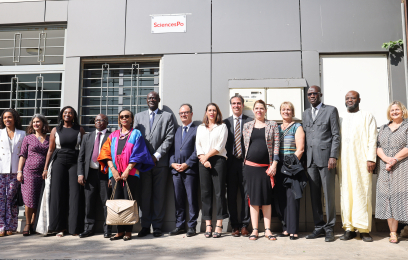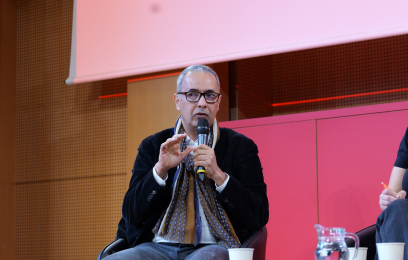SUMMARY
One year after their graduation, more 2015 Sciences Po graduates had started work in comparison with those who graduated in 2014. They also found their first job more quickly. The overall rate of employment was 95,7% which means that since graduating from Sciences Po, more than 9 graduates out of 10 who chose to enter the labour market have already had a job.
The 2016 edition of the professional follow-up survey of Sciences Po graduates, which reviews the situation of 2015 graduates one year after their graduation, was carried out under the scientific supervision of Anne Boring (OFCE-PRESAGE) and Roberto Galbiati (CNRS).
The total number of 2015 graduates who participated in the survey was 1,447 out of 1,944, a 74% response rate.
Higher employment rates and shorter periods before employment
76% of Sciences Po Master’s graduates chose to enter the labour market (75% in 2015, 77% in 2014 and 78% in 2013).
Of those students who decided to enter the labour market, 91% are working (88.8% in 2015, 85.5% in 2014 and 86.7% in 2013), while 8.8% are seeking employment (11.2% in 2015). It should be noted that 53.6% of respondents seeking employment have already had a job since they left Sciences Po, taking the employment rate to 95.7%.
Periods between graduation and employment are shorter than for the previous year: 88.4% of graduates found a job in less than 6 months compared with 87% in 2015.
The proportion of stable employment has increased to 74% compared with 66% in 2015. The number of civil servant positions has increased over this period. The number of temporary contracts has decreased.
The salaries of Sciences Po graduates remain high
Based on data from 767 respondents, average gross annual earnings were €36,560. This figure can be compared with average gross annual earnings recorded by the Conférence des Grandes Ecoles (French association of accredited engineering and business schools) in 2016 for 2015 graduates, which were €34,681.
Still a wide variety of jobs
On the whole, there is little change in the way jobs are distributed among different business sectors. 71% of graduates in work are employed in the private sector (compared with 73% in 2015 and 69% in 2014), 8% work in an international organisation or European institution (compared with 7.6% in 2015 and 7.5% in 2014) and 21% are employed in the public sector (18.4% in 2015 and 23% in 2014).
In line with the diversity of the seven graduate schools at Sciences Po, graduates’ professions remain varied within such sectors as Auditing/Consulting, Public Administration, Banking/Finance/Insurance, Industry/Energy/Transport, Marketing/Communication, NGOs/Charities, International Organisations, Publishing/Journalism, Education/Research, Urban design/Town planning, Sales/Distribution, Arts/Cinema, Law etc.
More than one third of graduates start their careers abroad
35% of those surveyed work outside France, a high proportion compared with the 16.6% of total respondents in the Conférence des Grandes Ecoles survey.
ACCESS TO EMPLOYMENT
The survey found that 76% of respondents chose to enter the labour market, compared with 75% in 2015 and 77% in 2014.
Table 1: Graduates one year after obtaining their Master’s degree
CONTINUING STUDIES
Among the 21% of respondents who decided to continue their studies:
- 7% continue as PhD students at Sciences Po
- 33% follow a competitive exam preparation course at Sciences Po
- 2% follow another programme at Sciences Po
- 58% continue their studies in another establishment
EMPLOYMENT RATE FOR SCIENCES PO GRADUATES
91% of graduates who chose to enter the labour market are either employed or completing an internship, compared with 88.8% in 2015.
Of the respondents who are seeking employment, 53.6% have already been employed since they left Sciences Po, taking the employment rate to 95.7%.
The period before employment is getting shorter as 88% of graduates in work found their first job within 6 months of graduating (87.4% in 2015 and 81% in 2014) and 39% before they left Sciences Po.
Table 2: Employment rates before and after graduation
A WIDE VARIETY OF JOBS REFLECTING THE RANGE OF MASTER'S PROGRAMME SPECIALTIES
- 71% of working graduates are employed in the private sector (73% in 2015 and 69% in 2014)
- 8% are employed in an international organisation or in an European institution (7.6% in 2015 and 7.5% in 2014)
- 21% are employed in the public sector (18.4% in 2015 and 28% in 2013)

In line with the diversity of the Master’s programmes on offer at Sciences Po, the proportion of graduates’ professions belonging to the private sector is preponderant. It is also relatively important in the public sector, NGOs and associations, international organizations, culture, media and publishing.
Table 3: Jobs by business sector
To find out more, see the page on Master’s career prospects on the Sciences Po website: http://www.sciencespo.fr/formations/%C3%A9coles-masters
EMPLOYMENT BY GEOGRAPHIC ZONE
35% of respondents are working outside France.
Table 4: jobs by geographic zone (outside France)
QUALITY OF EMPLOYMENT
Table 5: Type of contract
The proportion of stable employment is 74%. The number of civil servant positions has increased over this period. The number of temporary contracts has decreased.
Earnings
The average gross annual earnings (including bonuses) were €36,560, slightly lower than the 2015 year
(€37,200).
The average gross annual earnings were higher abroad than in France.
Table 6: Average earnings France / abroad


